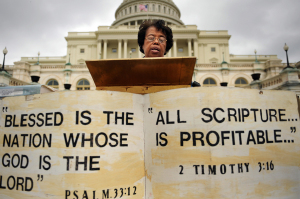Michael Brown's NAR Straw Man: Is the New Apostolic Reformation Just a Conspiracy Theory or Something More?

Michael Brown recently wrote an op-ed article for Charisma and the Christian Post titled "Dispelling the Myths about NAR (the New Apostolic Reformation." Brown's article confronts "misinformation" circulating in Christian circles about an alleged "conspiratorial, worldwide, demonic movement" known as the New Apostolic Reformation (NAR). He likens critics' concerns about NAR to wild-eyed concerns about the Illuminati. And he explains how he's spent much time, in recent months, debunking what he calls the "myth of NAR." But in his attempt to set the record straight, Brown got it wrong. His article contains a good deal of its own misinformation, including a careless assessment of key sources. In his misrepresentation of those sources, he creates a straw man interpretation of critics' real concerns about NAR – a straw man that's easier for him to knock down, but is not based on the legitimate concerns many people have about this movement.
One source Brown attempts to debunk is a book co-authored by myself and Doug Geivett, a professor of philosophy at Talbot School of Theology. Our book is titled "A New Apostolic Reformation?: A Biblical Response to a Worldwide Movement." It's been endorsed and highly praised by respected Christian scholars and leaders. These include Pentecostals and charismatics. They've noted that our evaluation is fair, balanced and carefully documented. And they've described our tone as respectful toward those with whom we disagree. But that's probably not the picture people will have of our work if they read only Brown's description of it.
What's more—contrary to Brown's claim—our book provides a very clear and precise description of NAR teachings. That description can also be found in the two-hour public dialogue we had with Brown and in articles published throughout my blog. Yet Brown says he still isn't certain how we identify NAR leaders or churches. It's puzzling how he could have missed this. Perhaps I should restate our description of NAR here: The core NAR teaching is that the church must be governed by present-day apostles and prophets. The key word in that definition is governed. By governed, NAR leaders mean that apostles and prophets must hold formal authoritative offices in church government. This definition has two important corollaries: (1) These apostles and prophets claim extraordinary authority, and (2) they claim to bring new revelation the church needs to advance God's kingdom.
These teachings may sound radical and shocking to Christians who aren't familiar with NAR. But they're entering the mainstream. And they differ from classical Pentecostalism and from the historic teachings of charismatics. So it's important for all Christians to get up to speed on this movement.
Let's look at some specific things Brown got wrong in his article.
Lumping people together
Contrary to what Brown suggests, we haven't "put widely disparate groups under the same heading." And we haven't lumped Pentecostal and charismatic beliefs together under a NAR umbrella. As you can see above, we identify NAR leaders and NAR churches as those who fit that specific definition above and who promote those specific teachings. For example, we don't include the Assemblies of God – the world's largest Pentecostal denomination. The Assemblies of God is concerned about NAR and has even published two position papers challenging NAR teachings that apostles and prophets must govern. You'll find these documents here and here. While some individual Assemblies of God churches have allowed NAR teachings into their churches, the denominational leadership is opposed.
In short, we've focused our arguments on NAR teachings about governing apostles with their essential new revelations. We certainly have not argued for cessationism. We make that point very clear in our book and in our interviews. Our concern is not about miraculous gifts, but with the claim that apostles and prophets must govern. Gifts vs. governing. Those are very different things. This explains why many Pentecostals and charismatics – who believe the miraculous gifts are for today – are concerned about this movement.
24/7 prayer
Contrary to what Brown has repeatedly claimed, we have never said that hosting 24/7 prayer makes a church a part of the NAR movement – in and of itself. Brown took a statement I have made about 24/7 prayer rooms out of context. This gives his audience the grossly false impression that I'm anti-prayer. But that statement was part of a larger post I wrote identifying several signs of possible NAR influence in a church. In that article, I repeat twice that the core NAR beliefs are governing apostles and prophets who bring new revelation.
That being said, in our book we show how many of the 24/7 prayer rooms popping up in churches around the world today are directly related to NAR. They're modeled after the 24/7 prayer room run by the International House of Prayer in Kansas City, Missouri (IHOPKC). Mike Bickle, the founder of IHOPKC, claims he received revelation from the "prophet" Bob Jones to start a 24/7 prayer room. And Bickle's teachings indicate that the establishment of other 24/7 prayer rooms throughout the world is an essential new practice for the church. He claims that they'll play a crucial role in the unfolding of God's end-time plans for the earth. Shockingly, he teaches that, through the practice of 24/7 prayer, the last generation of Christians will actually cause the tribulation, described in the book of Revelation. In prayer rooms throughout the world, people will "release," in unison, judgments of God that will kill millions of people and wipe out entire cities. See those teachings here and here and here.
The teaching that the church, through the practice of 24/7 prayer, will cause the tribulation is a completely new understanding of the book of Revelation. And it's very troublesome. IHOPKC released a statement to make Bickle's teachings about the end time appear more mainstream by associating them with the respected pastor John Piper. But they're far from mainstream. And as far as we know, Piper does not endorse them. IHOPKC will need to release more than that brief statement to put concerns to rest. Bickle's end-time views are even more concerning since IHOPKC recently launched a Center for Biblical End-Time Studies. This center will likely popularize these novel teachings.
These are the reasons why we have identified 24/7 prayer as one possible indicator of a NAR church. The way Bob Jones and Mike Bickle have brokered this new teaching is a clear example of how "essential" new teachings have been introduced and implemented through an authoritative prophetic word.
The usefulness of the NAR label
Brown takes issue with the NAR label – and asks critics to abandon its use when referring to people, churches, and organizations today. The specific label isn't so important. But it's very important to differentiate those Pentecostals and charismatics who see apostles and prophets as merely gifts or functions – like a Hudson Taylor or a William Booth – from others who see apostles as an office, having extraordinary authority and giving the church new revelation in ways similar to the authoritative apostles in the Bible.
Consider, for example, Heidi Baker of the organization Iris Global. Many people regard Baker as a present-day apostle. But do they view her as an apostle in the lesser sense of the word – as merely a church planter who is breaking new ground for the gospel? Or do they regard her as something more, as holding an office as an apostle, with far-reaching authority and the ability to bring new, crucial revelations to the church? This is the crux of the issue. Is someone like Heidi Baker a "little-a" apostle (a Hudson Taylor, church-planting-type of apostle) or a "big-A" Apostle (like the Apostle Paul who exercised a far-reaching authority and whose revelation was unequivocally authoritative for Christians)?
Certainly, one can understand how some may view Baker as a more authoritative, "big-A" Apostle given her claims. She claims to have had a face-to-face encounter with Christ, to have received a special "apostolic" commissioning from him, to work miraculous signs and wonders including raising the dead, to prophesy to nations, and to give revelation to churches outside her own network.
Besides Baker, how are others viewed by their followers? What about Bill Johnson or Ché Ahn or Rick Joyner? We make the case in our book that many of these leaders are not viewed merely as church planters. They're viewed as apostles possessing extraordinary authority and revelation.
Thus we cannot, in good conscience, take Brown's suggestion to stop using the label "NAR." People must have a way to distinguish these two types of beliefs about apostles. One is benign and can be found in Scripture, as we pointed out in our book. The other is an alarming invention and should cause God-fearing and Scripture-reading Christians to take heed.
Many readers of our book agree that we provide strong evidence that NAR is a global movement. We also provide detailed documentation and careful argumentation showing that this global movement promotes the core teachings and practices that are related to the historic NAR movement that C. Peter Wagner named and wrote about. Contrary to what Brown claims, the use of the NAR label should not be used only in reference to the organization once led by Wagner. This does not mean that every NAR leader today agrees with everything that Wagner wrote and taught. But there's substantial agreement among their views and his, as we've shown in our book with extensive citations from their own literature. (Following our April 18 podcast dialogue with Brown, he acknowledged that he had not read our book. It is rare for a confident critic to neglect the sources he attacks.)
Brown's own organization uses the term NAR
Brown chides critics for using the label NAR. Yet he is himself a council member of an organization that seeks to "usher in a new apostolic reformation." That organization is the U.S. Coalition of Apostolic Leaders (USCAL), which is affiliated with the International Coalition of Apostolic Leaders. Based on the material contained on their websites, both clearly see themselves as extensions of the movement Wagner wrote about.
Recently, Joseph Mattera, the leader of USCAL, has led a campaign to rebrand this organization. He's written articles claiming that a correction course is in underway in NAR. He expects this correction course will change the way many apostles are viewed. They won't be seen as holding hierarchical, governing offices. Rather they will be seen merely as having the function of apostles – which, he implies, is far less threatening. He also claims these apostles aren't seeking to rule over pastors, but rather to serve them.
And yet, Mattera's claims are undermined by the Statement of Faith on the USCAL website. That website refers to apostles specifically in terms of "offices." Also, in his article, Mattera writes that a goal of this NAR movement is for churches to change from being pastorally led to being apostolically led. It sure sounds like apostles are in charge. Mattera's own book, published in 2015, teaches that present-day apostles exert "governmental rule" over churches, which includes rule over pastors of those churches. Clearly, he is sending contradictory messages.
We hope that USCAL truly does reject unbiblical and unhealthy teachings. But for now, the rebranding efforts appear to be superficial. The effort may be designed to silence their critics rather than to bring about true change.
IHOPKC's explicit denial
Brown mentions that IHOPKC has issued a statement differing with some tenets of NAR. He mentioned this same statement during our two-hour dialogue. His point is that IHOPKC should not be accused of being NAR if they flat-out deny it. We corrected Brown during the on-air dialogue, pointing out that what the statement doesn't say is as important as what it does say. IHOPKC may not officially designate any of their own leaders with the titles "apostle" or "prophet," but that does not exempt them from being NAR. Bickle has, for decades, promoted teachings about governing apostles and prophets who claim to exert extraordinary authority and give new revelations. For example, see his teachings here and here and here. People may be interested to hear that Bickle once claimed God took him to the courtroom of heaven. There God told him that, if he were found faithful, he'd be an apostle with immense authority and divine revelation. (Listen to audio recordings of Bickle making these startling claims starting with recording No. 3 at 1:21:00 and continuing to recording No. 4.) The question remains: Does Mike Bickle still believe that God told him he'd one day be an apostle? Whatever the answer may be, his promotion of present-day governing apostles and prophets are what make IHOPKC a part of the NAR movement; it makes no difference whether an organization calls any of its current leaders "apostles" or "prophets."
Calling a movement "aberrant"
Brown also calls on NAR's critics to stop describing NAR as an "aberrant movement." He cites this as an example of "extreme rhetoric" that slanders our brothers and sisters in Christ. We're surprised to hear him say that the word "aberrant" is extremist. He used the same word during our public dialogue with him to describe the doctrine of cessationism. Does he slander his cessationist brothers and sisters in Christ when he describes their views as aberrant?
When we use the word "aberrant" to describe NAR we use it according to its long-accepted, theological usage: a harmful departure from standard teachings. Our description of NAR teachings as aberrant is supported by our book's careful argumentation. We show that NAR teachings represent a break with Christian teaching through the centuries, teachings that cannot be supported with Scripture. Little wonder that these doctrines have brought harm to the church.
The source of divisiveness
Brown sees the fruit of our work as being "divisive and destructive." But Christians – of all people – should be able to publish books about their own positions and air out their disagreements without being accused of being divisive for doing so.
We agree with Brown that some critics of NAR haven't been careful when describing this movement. Some haven't shown charity to those who hold NAR beliefs. Some have even identified individuals as leaders of NAR without solid evidence for doing so. That saddens Brown. And it saddens us. He's understandably upset about this. As Christians, we should always disagree with gentleness and respect.
But not all critics of NAR are guilty as charged. We, like Brown, want to see "constructive, fruitful interaction." We certainly haven't attempted to scare people with "false accusations of a conspiratorial, worldwide, demonic movement." Rather, we've brought forth documented data and presented arguments on the basis of Scripture and careful reasoning. In all this we've sought to follow the example of the Bereans in Acts 17. Those early Christians heard the teaching of the apostle Paul. Then they diligently searched the Scriptures to be sure his teaching was true.
We don't believe those who question the teachings of today's apostles should be accused of being divisive. Division occurs when teachers introduce new teachings that cannot be supported by Scripture. People in those teachers' churches are left with two bad choices. Either they must accept what the teacher says – even if his teachings cannot be supported with Scripture. Or they must challenge the teacher. Many who have challenged teachings about apostles and prophets have been forced out by leaders of their churches. This is a true source of division.
In short, Brown's article was careless. He didn't interact with the reasons we've presented. He didn't acknowledge the evidence we've brought to bear. Rather, he mischaracterized and oversimplified our case.
And Brown has done the very thing he accused of us. He puts all critics in the same basket: they all misunderstand what NAR is. This can be seen in the way he opens his article. He gives a lengthy description of NAR from a critic of the movement. But he doesn't identify the critic; he doesn't produce his source. The implication is that this critic speaks for all NAR critics.
The way forward in this discussion is to use clearly defined terms, which we have offered, and which Brown and others have yet to address and talk about: the governing offices of apostle and prophet, with their corresponding authority and revelatory power as distinct from apostolic and prophetic gifts. To equivocate when using the terms "apostle" and "prophet" is to obfuscate and to lead God's people into confusion rather than truth.



























